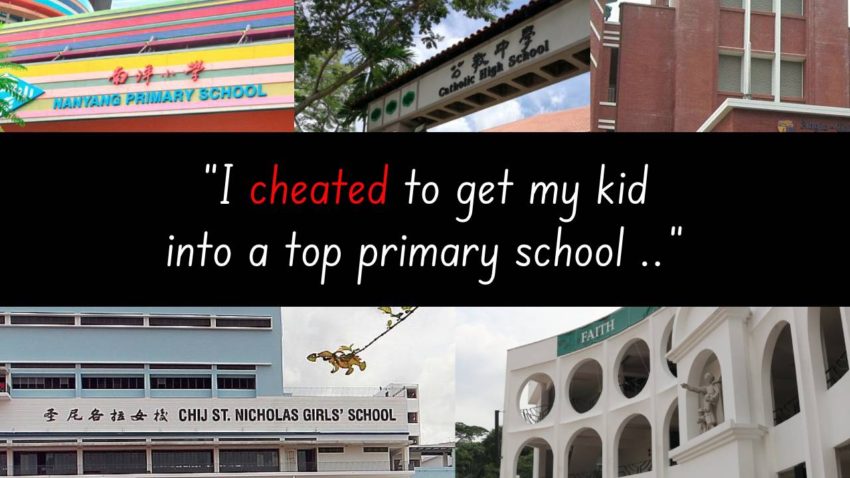In Singapore’s highly competitive Primary 1 (P1) registration system, one rule stands out as especially powerful: living within 1km of a school gives your child the highest priority — even above alumni, volunteers, and grassroots leaders in certain phases.
But what many parents don’t realise until it’s too late is that this <1km rule has created a loophole that some exploit ruthlessly — often at the expense of families who follow the rules.
Here’s how some parents cheat or game the system to get their child into top schools like Nan Hua Primary, Henry Park, Nanyang Primary, Ai Tong, and more.
1. Renting Just for the Address (a.k.a. “decoy home”)
Some parents rent an apartment or condo unit just to get the address — without any intention of living there long-term. This tactic was so common that MOE implemented a 30-month stay requirement in 2015.
What’s required now:
Parents must reside at that address for 30 months from the start of the registration exercise — or risk their child being transferred to another school.
How people cheat:
- They rent the unit, register the address, but don’t actually live there.
- Some throw in a few mattresses or belongings just in case MOE inspects.
- After securing a place, they move back to their actual home.
Why this works (sometimes):
Inspections are rare and hard to enforce. MOE depends on honesty or third-party reports.
2. Using a Fake or Borrowed Address
This is a more serious offence. Some parents falsify documents or borrow an address from a friend, relative, or even a stranger — without ever moving in.
According to The Sunday Times, some parents offer $1,000–$2,000 to homeowners or agents for temporary use of their address during registration.
Fake address setups may include:
- Falsified tenancy agreements
- Faked utility bills or bank statements
- False declarations at police posts to update NRIC addresses
3. Buying and Flipping Property for School Access
We’ve seen documented cases (including one highlighted on Reddit in 2024) where wealthy parents buy a unit in a school’s “elite zone,” get their kids in, and then sell the property for a profit.
One case at Parc Clematis (beside Nan Hua Primary) involved:
- A 3-bedroom unit bought around launch price (~$1.5M)
- Two children admitted to NHPS
- Unit resold for $2.1M in 2024, likely netting a profit of over $600K
Not only did the parents secure coveted school spots, they made money doing it — despite the 30-month rule, since the condo was only completed in 2023.
4. Changing NRIC Address Without Moving In
Singapore allows residents to update their NRIC address at the police post with documentary proof. The process, though regulated, can still be manipulated:
- Provide a friend’s address and a signed tenancy agreement
- Show a bill mailed to that address
- Update the IC
Once updated, the address is valid for registration. But MOE has caught cases where no one was actually staying at the address.
In 2015, one couple was fined $9,000 in total for providing false information. Their child had already been admitted. MOE said they would follow up — but offered no clear indication of transfer or reversal.
5. Riding on Lax Enforcement
While MOE does say they will investigate, enforcement is reactive, not proactive. That means:
- No home visits unless there’s a report
- No blanket audits of addresses
- Consequences vary, from warnings to transfers, but are rarely publicised
Some parents see this and treat the rules as “guidelines” rather than hard rules — calculating that the upside is worth the risk.
The Consequences (Or Lack Thereof)
While faking an address can lead to:
- Fines up to $5,000
- Jail terms (in rare cases, like the 11-month jail sentence in 2007)
- Transfer to another school
In many cases, cheaters aren’t caught. And even if they are, the child usually keeps the spot — or is transferred quietly without naming and shaming.
Who Loses in This Game?
The ones who follow the rules.
- The working-class families who genuinely live within 1km but lose out due to oversubscription
- The parents who don’t have money to buy property just for address gaming
- The honest ones who apply in good faith under Phase 2C, only to be balloted out
Final Thoughts: Is This the Kind of Meritocracy We Want?
Singapore’s education system prides itself on fairness and equal opportunity. But loopholes like the <1km address hack create an uneven playing field — where wealth and cunning can easily outweigh honesty and effort.
MOE has taken steps to plug the gaps, but more transparency, consistent enforcement, and harsher penalties could help restore faith in the system.
If nothing changes, many will continue to game the system while the rest quietly lose.
